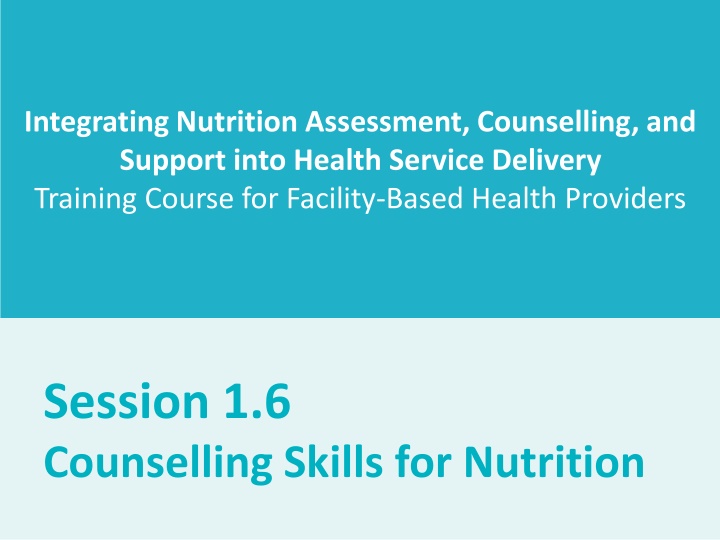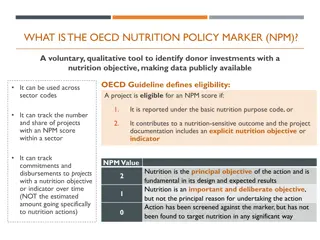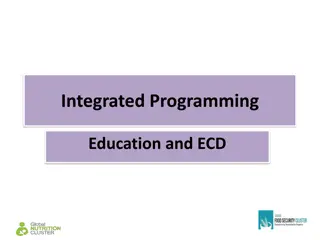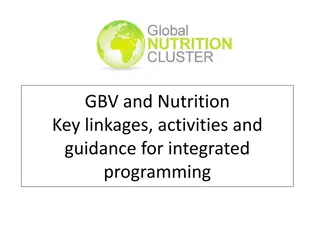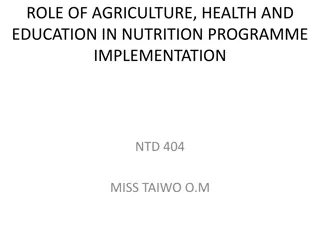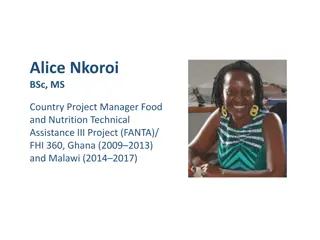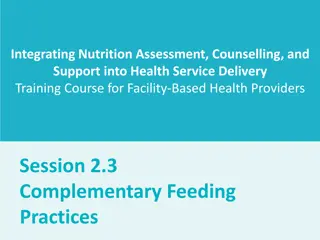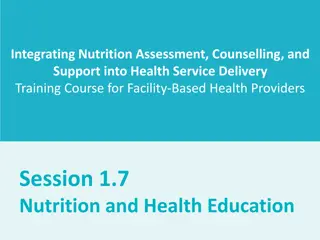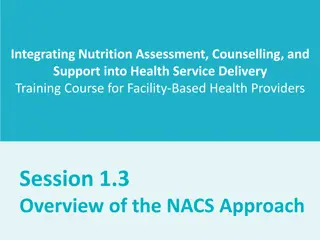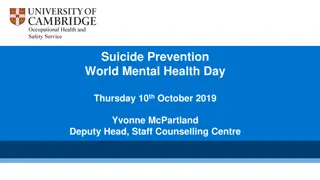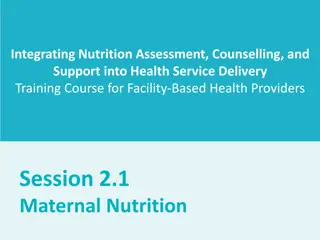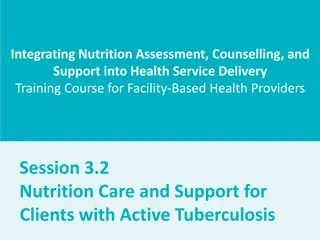Integrating Nutrition Counselling for Health Providers
Explore the importance of nutrition counselling in health service delivery, understand key counselling practices, and learn effective communication skills to support clients in addressing nutritional problems. Discover the definition of counselling, its objectives, and best practices while avoiding common pitfalls. Improve your ability to assess feeding practices, identify issues, and support clients in making informed decisions for better health outcomes.
Download Presentation

Please find below an Image/Link to download the presentation.
The content on the website is provided AS IS for your information and personal use only. It may not be sold, licensed, or shared on other websites without obtaining consent from the author.If you encounter any issues during the download, it is possible that the publisher has removed the file from their server.
You are allowed to download the files provided on this website for personal or commercial use, subject to the condition that they are used lawfully. All files are the property of their respective owners.
The content on the website is provided AS IS for your information and personal use only. It may not be sold, licensed, or shared on other websites without obtaining consent from the author.
E N D
Presentation Transcript
Integrating Nutrition Assessment, Counselling, and Support into Health Service Delivery Training Course for Facility-Based Health Providers Session 1.6 Counselling Skills for Nutrition
Session Objectives By the end of the session, participants will be able to: Explain the importance of counselling in nutrition Describe counselling skills Demonstrate the ability to counsel in nutrition Integrating Nutrition Assessment, Counselling, and Support into Health Service Delivery 2
Discussion What is counselling? What are key practices for effective counselling? What practices should you avoid? Integrating Nutrition Assessment, Counselling, and Support into Health Service Delivery 3
Definition of Counselling Counselling is a form of interpersonal communication through which people are helped to assess their current situation and explore ways to address problems. Effective counselling respects the client s own thoughts, beliefs, and culture. Integrating Nutrition Assessment, Counselling, and Support into Health Service Delivery 4
Definition of Counselling Counselling involves: Helping a person share his/her problems and express concerns Appreciating the client s efforts to address the problems (which can strengthen the client s self- confidence) Providing information about the problems Helping a person examine the cause of the problems Suggesting and exploring possible interventions or action plans to resolve problems or reduce risk Helping a person make informed decisions Integrating Nutrition Assessment, Counselling, and Support into Health Service Delivery 5
Definition of Counselling Counselling is not: Telling a client what you think he/she should do Pushing the client toward a particular action Arguing with the client Integrating Nutrition Assessment, Counselling, and Support into Health Service Delivery 6
Importance of Nutrition Counselling Helps the health worker: Understand the client s feeding practices Identify actions to address the problem Identify factors that influence a patient s practices Understand barriers Helps the patient: Understand the feeding problem, causes, and consequences Identify possibilities for food availability and preparation Strengthen self-confidence and build trust Integrating Nutrition Assessment, Counselling, and Support into Health Service Delivery 7
Counselling Approach: GATHER The approach uses the following steps: Greet the client (and develop rapport) Ask how the client feels about his/her nutritional status and food intake Tell the client about options for addressing his/her nutritional problem(s) Help the client make informed choices Explain fully the choice(s) the client has made Reassure the client about her/his choices and give a return date for the next visit Integrating Nutrition Assessment, Counselling, and Support into Health Service Delivery 8
Counselling Skills: Active Listening Active listening includes: Nonverbal communication Open questions Reflecting back what the client says Empathy Nonjudging words Helps counsellors build rapport with a client and learn about her/his beliefs, level of knowledge, feelings, and practices/behaviors that might affect the client s nutritional status. Integrating Nutrition Assessment, Counselling, and Support into Health Service Delivery 9
Role Play: Active Listening Break up into small groups and perform the role plays. Open questions Reflecting back Empathy Nonjudging words Integrating Nutrition Assessment, Counselling, and Support into Health Service Delivery 10
Counselling Skills: Confidence-Building and Support Confidence-building and supportive skills include: Accepting the client s thoughts and feelings Recognizing and praising what the client is doing right Providing practical help Providing relevant information in simple language Making suggestions to the client, not giving commands Arranging for follow-up and ongoing support Building a client s confidence and providing support can help the client carry out her/his decisions and resist pressure from other people. Integrating Nutrition Assessment, Counselling, and Support into Health Service Delivery 11
Role Play: Confidence-Building and Support Break up into small groups and perform the role plays. Accepting the client s thoughts and feelings Providing relevant information in simple language Integrating Nutrition Assessment, Counselling, and Support into Health Service Delivery 12
Group Work: Counselling using GATHER Break into four small groups. Take 10 minutes to plan your case scenario. Each group has 5 minutes to present. The audience will provide feedback, specifically on use of GATHER, active listening, and confidence- building/support. Integrating Nutrition Assessment, Counselling, and Support into Health Service Delivery 13
Planning for a Counselling Session Before the session, a counsellor should: Ensure he/she has enough time to give the client Have a private place where the client can discuss issues comfortably without any intrusions Understand the content of the counselling cards Have all counselling tools/materials in place: o Counselling cards o Functioning/accurate weighing scale o Guide to locally available foods o Handouts, references, meal plan/drug-food plan for client o Necessary forms (referrals, log, register, tally sheets, appointment calendar) o Notes on previous visits with the client Integrating Nutrition Assessment, Counselling, and Support into Health Service Delivery 14
Thank you! Questions, additions, and clarifications? Integrating Nutrition Assessment, Counselling, and Support into Health Service Delivery 15
